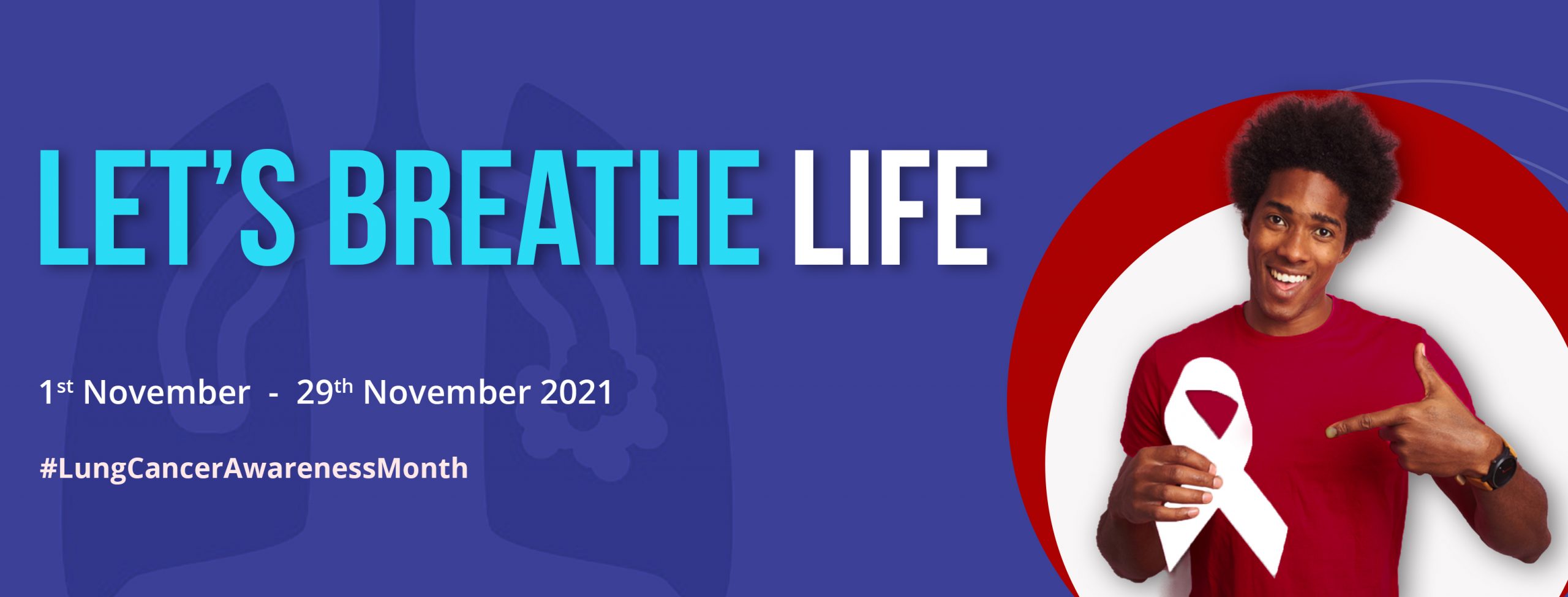Lung Cancer Awareness Month 2021
145 viewsLung Cancer, the second most common cancer in both men and women, is estimated to report 1.9 million new cases in 2021. These alarming statistics have made it important more than ever to spread awareness amongst people and instead of getting disheartened, fight against it to overcome this deadly disease. Here’s a detailed excerpt of the whats, hows and whos of lung cancer.
What exactly is Lung Cancer?
Cancer is basically caused when the cells of the body start growing out of control. If cancer starts in the lungs, it is known as lung cancer.
Lung Cancer starts infecting and damaging your lungs and if immediate treatment is delayed, it may start spreading to other internal organs, mostly the brain. Similarly, cancer from other organs can also affect the lungs too.
Types of Lung Cancer
There are two types of lung cancers, based on causes and treatment:
- Small Cell Lung Cancer (SCLC): Also known as Oat Cell Cancer, about 10% to 15% of all lung cancers are small cell lung cancer. This type of cancer tends to grow very quickly and 70% of people will have highly-spread cancer cells by the time they are diagnosed with it. Since it grows very rapidly, it is mostly treated through chemotherapy and radiation therapy.
- Non-Small Cell Lung Cancer (NSCLC): This type of lung cancer accounts for 80% to 85% of cases. It is any type of epithelial lung cancer and the most common types are adenocarcinoma, squamous cell carcinoma, and large cell carcinoma.
NCSCLC is usually less sensitive to chemotherapy and radiation and is often treated through surgery. Though, at times chemotherapy is recommended post-surgery for long-term survival.
Risk Factors that cause Lung Cancer
Increasing age is one of the biggest driving forces of accounts for most of the cases. But there are various other risk factors to look out for, including,
- Smoking – Smoking cigars, pipes, or cigarettes are the leading factor and is the cause of almost 80% of lung cancer deaths.
- Second-Hand Smoking – Even if you don’t smoke, inhaling second-hand smoke highly affects your lungs and makes you prone to lung cancer.
- Radons and other Toxins – With the drastic increase in air pollution and deteriorating air quality, we inhale quite an amount of harmful toxins which highly affect our lung health.
- Family History – The siblings and family members of the person who had lung cancer at a very young age have likely chances of developing lung cancer.
- Radiation Therapy – People who have had radiation therapy at the chest for other treatments, have very high chances of getting affected by lung cancer.
How can one know if they are having lung cancer?
Though in most of the cases, the patients of lung cancer have observed the symptoms at a very later stage, here are a few commonly found symptoms:
- Extensive coughing
- Shortness of breath
- Coughing with blood
- Feeling tired most of the times
- Chest pain
- No cause weight loss
Apart from these common symptoms, people experience swelling in their lymph glands. If you even have the slightest of doubt, you can visit your doctor and get it checked.
What is Cancer Screening, and who should ideally opt for it?
In simple terms, screening refers to early testing for a disease when you have no symptoms or history of the disease. The only recommended screening test for lung cancer is Low-Dose Computed Tomography, also known as LDCT.
Anyone who has a history of heavy smoking should definitely opt for an LDCT test. Adding to that, even if you fall in the age group of 50-80, you should opt for LDCT.
Lung Cancer in Tanzania
According to the reports, in the list of medical diseases and deaths caused due to it, Lung Cancer ranks number 14 in Tanzania. Due to the alarming statistics and risk factors associated with it, a lung cancer registry was set up. The lung Cancer repository collects in detail all the information of the people who have been affected by lung cancer, their medical history as well as their medical representatives, guardians, and caretakers. This helps the researchers and medical experts study the causes, symptoms and can create an effective prevention strategy based on that.
Dr. Nestory Masalu, Bugando Medical Centre, Mwanza City, explained that the lung cancer control program was set up due to the similarity of symptoms to the condition of pulmonary Tuberculosis.
There was yet another initiative that was a part of the Multinational Lung Cancer Control Program (MLCCP) with the aim to spread awareness, provide understanding and provide access to early diagnostic services.
The month of November is dedicated to Lung Cancer Awareness to spread awareness since 1995. Over the years, the government as well as the medical centers have played their part and made significant improvements in providing advanced medical support. It’s time to combat this disease, overcome our fears, play our part and work towards making the world a better place to live.

